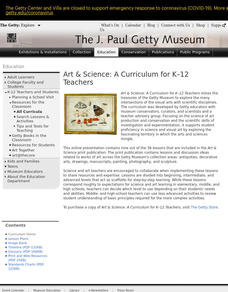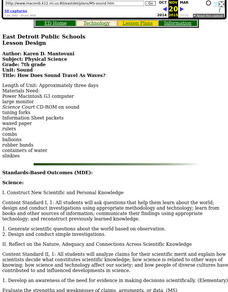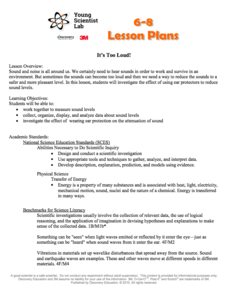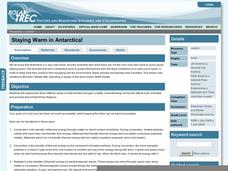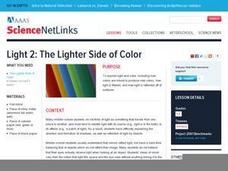Curated OER
The Effects of Ultraviolet Light on Lumbriculus
Students explore the effects of ultraviolet light on Lumbriculus. They expose ultraviolet light to Lumbriculus (worm) and determine the lethal exposure time. They examine the worm and record their observations.
It's About Time
The Earth-Moon System
Explore the earth-moon system with blossoming astronomers in this fun-filled activity. They begin by investigating lunar phases and differentiating between each. They continue the activity by learning about tidal forces and how these are...
Curated OER
Atomic Absorption Determination of Zinc and Copper in a Multivitamin
Advanced lab apprentices prepare zinc and copper solutions to which they will compare the same minerals from a multivitamin. Using absorption spectroscopy, they analyze the contents of the multivitamin for concentration. This lab can be...
Colorado State University
How Can I Turn a Solar Oven into a Refrigerator?
Whether you want to heat things up in science class or cool things down a bit, an intriguing lab's got you covered! Science scholars explore the principles of thermodynamics using a solar oven, then change the conditions to turn their...
Curated OER
Seeing Interference Fringes with a Telescope
Students construct an interferometer using a simple telescope. In this physics lesson, students explain how light waves create the fringe patterns. They observe patterns made by different objects in the sky and compare them.
Center Science Education
Feeling the Heat
What is an urban heat island? Middle school meteorologists find out by comparing temperatures at different locations on campus. They relate their findings to what might be happening in a concrete jungle and how it impacts local weather....
Curated OER
Polarization
Eighth graders study the basic facts of polarization. In this light waves lesson students demonstrate some activities illustrating interference patterns.
Curated OER
What Really Matters When it Comes to Sound?
Young scholars conduct experiments to learn about sound wave vibrations in objects and pitch. Students test how varying the volume of water in a vessel changes frequency and pitch.
Curated OER
Sound, Heat, and Light
In this sound, heat, and light worksheet, students fill in a KWL chart for what they know, what they want to know, and what they learned about sound, heat, and light. Students complete 3 sections in the graphic organizer.
Curated OER
The Sun's Energy
Sixth graders examine how the sun's energy arrives as light with a range of wavelengths. They discuss the characteristics of light, examine the color of light using a spectroscope, and conduct an experiment using water and thermometers....
Chicago Botanic Garden
Albedo, Reflectivity, and Absorption
What is reflectivity, and what does it have to do with the Earth's climate? As reflectivity is measured by albedo, scientists can gather information on Earth's energy balances that relate to global warming or climate change. Budding...
Curated OER
Capturing Light: The Science of Photography
Students create their own cameras to understand how artists use light to capture an image in a photograph. In this light lesson plan, students use tape, wax paper, rubber bands, and more to create their cameras.
PBS
Electromagnetic Spectrum | UNC-TV Science
Illuminate lightwaves, even those not visible to the human eye, in a concise activity about the electromagnetic spectrum. Pupils watch and listen to an animated video describing the electromagnetic spectrum as well as frequency and...
Curated OER
How Does Sound Travel As Waves?
Seventh graders participate in a number of activities designed to increase their understanding of how sound is generated and how it travels.
Curated OER
Waves, Sound, and Light
Ninth graders explain waves in terms of energy transfer and describe their basic types and characteristics. They solve mathematical problems involving wavelength and frequency. Students conduct experiments in reflection and refraction.
University of Texas
Multi-wavelength Astronomy
Explore a land far, far away with a well-designed lesson that examines electromagnetic imaging as a way to obtain information about galactic structures. Learners begin to see the importance of looking beyond the visual spectrum to reveal...
Curated OER
Measuring Speed in the Universe
In this measuring speed in the universe learning exercise, students use photographs of 3 astronomical phenomena including supernova explosions, coronal mass ejections and solar flare shock waves to find how fast they move. The...
Curated OER
Looking at the World in a Different Light
In this lesson, 7th graders relate colors to wavelengths of light; explain how we see colors and describe types of waves and their technological applications. Students go through a tour and answers questions to the quiz as they go...
Discovery Education
It's Too Loud!
STEM scholars investigate sound attenuation by conducting an experiment in which they compare the farthest distance that they can hear a sound with and without ear protection.
Polar Trec
Staying Warm in Antarctica!
Has your class ever wondered how animals and scientists stay warm in the Polar Regions? Kids will investigate to understand the three types of heat transfer and how heat transfer affects those trying to stay toasty in sub-zero...
Curated OER
Super Gelatin
Students measure angles of refraction as the light travels through gelatin. In this experimental lesson students complete a refraction lab and plot their data.
Curated OER
The Lighter Side of Color
Students explore light and color, including how colors are mixed to produce new colors, how light is filtered, and how light is reflected off of surfaces. They read materials provided, complete worksheets, and complete hands-on activities.
Curated OER
Strange Sounds
Students investigate sound as a form of energy. In this energy, forces, and sound lesson plan, students explore how different sounds may be made as they make a variety of materials vibrate. Students observe the effects of vibrations and...
Curated OER
Now Hear This!
Students create a model of the inner ear. In this hearing lesson, students follow a series of directions to build a working model of the inner ear, then observe how the parts react to a variety of sounds.













